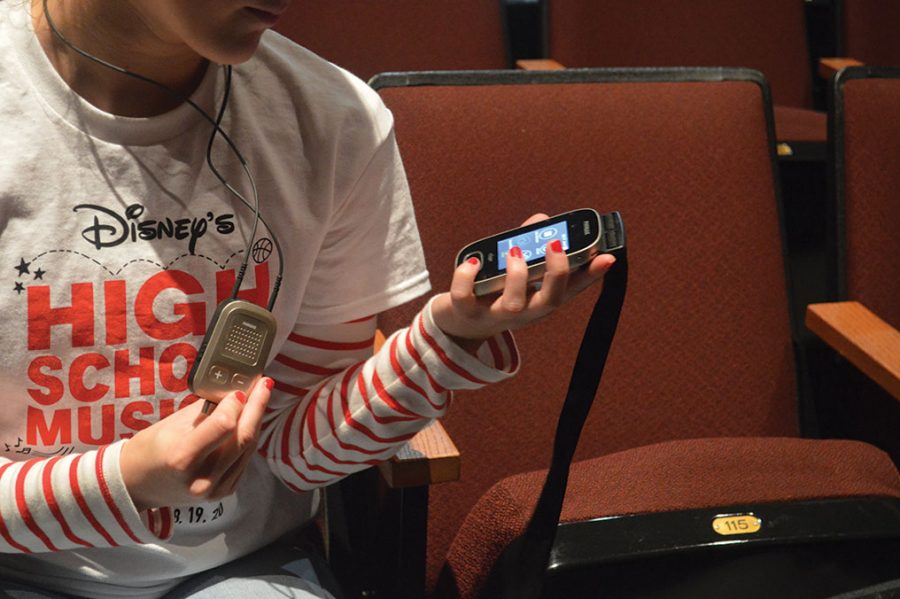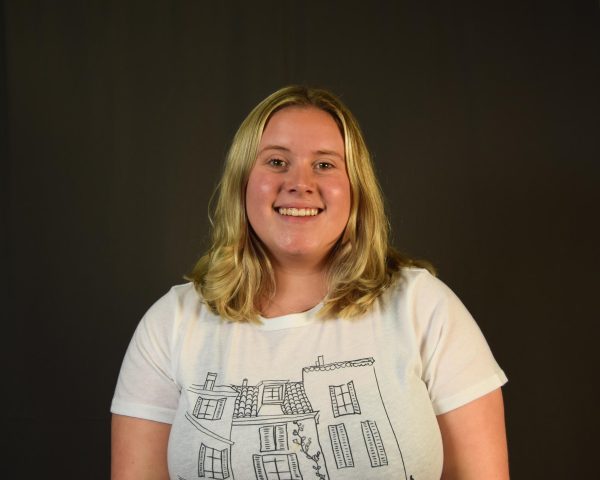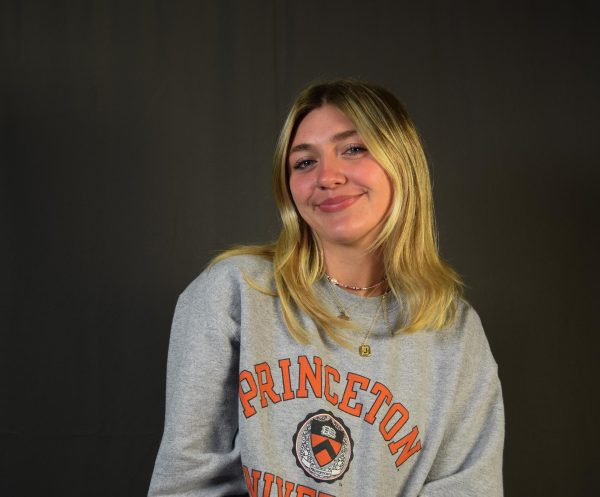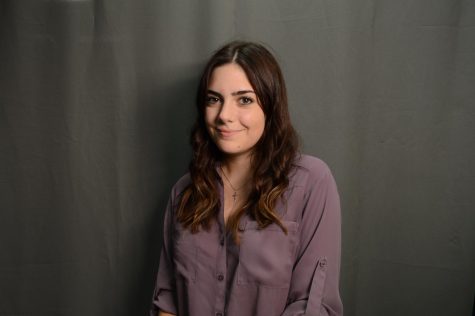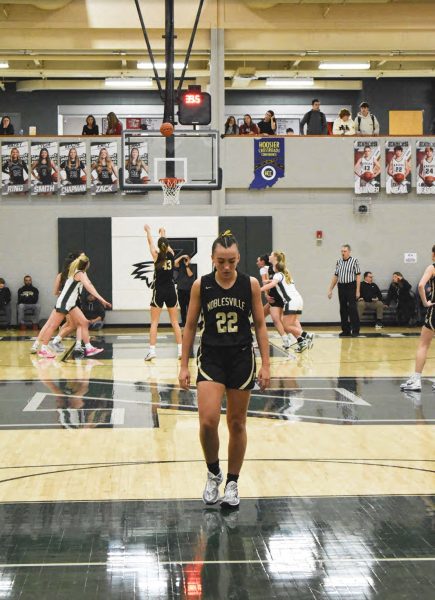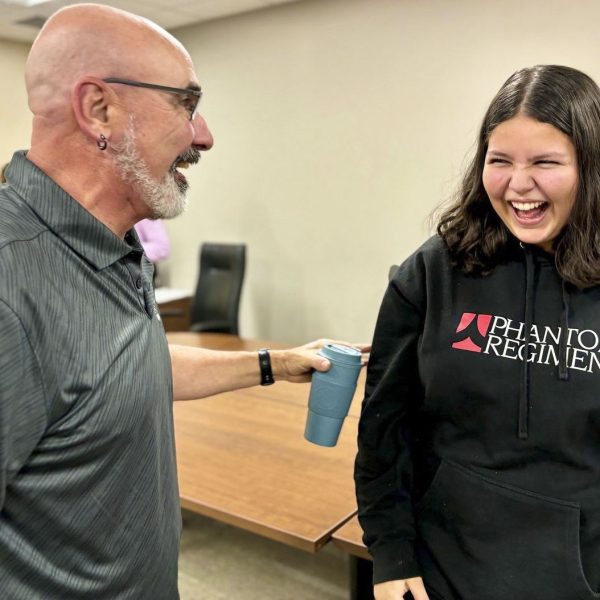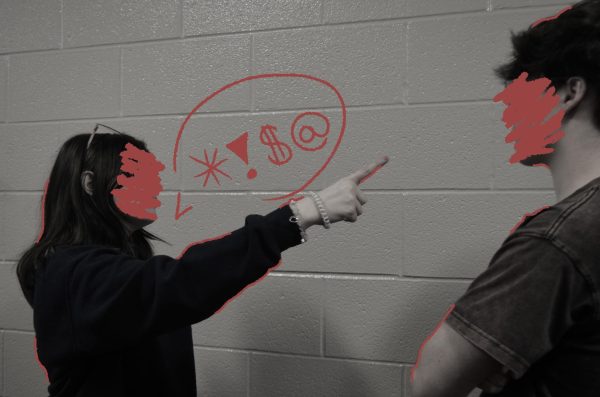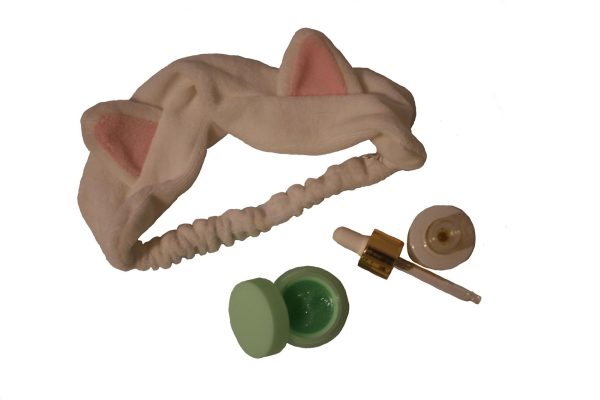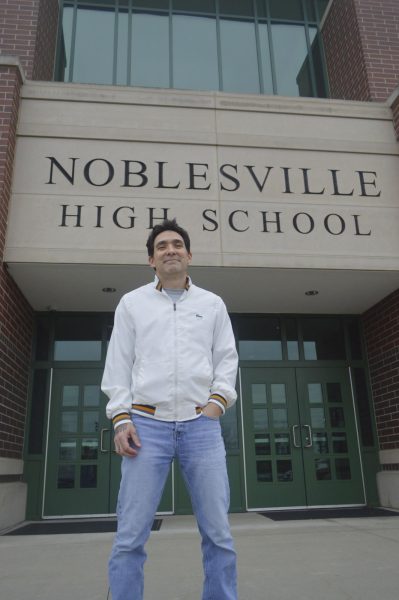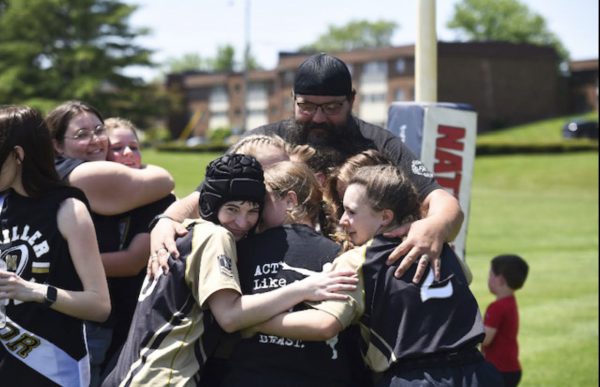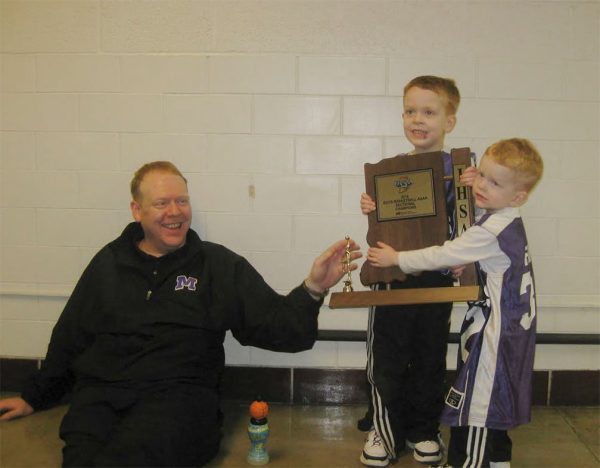Uphill climb: Students and staff share highs and lows of accommodations at NHS
Photo by Analyce Craft
Senior Maggie Brechbill shows her device that assists her in every class. This accommodation is provided to her by Noblesville Schools.
December 3, 2021
One in five teens in the U.S. say they’ve struggled to afford menstrual products, or even purchase them at all. Fourteen percent of all students in public school have a disability, but for many schools, the accessibility of education is an afterthought. With seven hours a day, five days a week spent in school, half of a student’s waking hours are spent inside the school building. The reality is that students need more than just pencils and paper to get through their school day. Without the proper attention and care to keep students’ needs met, the ability to thrive in such an environment becomes increasingly difficult.
Focus in
In most situations if you look in a room full of students, you won’t be able to tell who has diagnoses like ADHD, dyslexia, anxiety, and autism. Struggling with one of these disorders and it not being known by others can make everything ten times harder for these students. Are there enough things being done to help these students when it comes to tests and classwork at school?
NHS resource teacher Alex Eastin says that students with these disorders will have an individualized plan. This will help students when testing and while they are dealing with difficult situations in their learning.
“When a student has an identified disability, and it interferes with their learning, usually they will have an individualized plan that gives them accommodations for testing,” Eastin said.
Students have seven hours of classes here at Noblesville High School, but some are able to ask for a break from class.
“If a student has an identified disability that causes them to become over-stimulated, this is common with people with ADHD and autism, they can ask for a break from their teacher, “ Eastin said.
Here at NHS, there are procedures in place for these students, such as extra time on testing and being able to take breaks from class.
“If breaks are an accommodation in the student’s IEP, then the teacher is legally required to give the student a break.” Eastin said.
NHS Junior Luke Long was diagnosed with ADHD in second grade.
“The things that help me through the day are just like anyone’s: smiles, laughter and fun. Some teachers don’t teach to the needs of students with ADHD, and that’s kinda rough sometimes. NHS does what it does in an effective way,” Long says.
Long doesn’t necessarily see his disorder as a problem — he sees the light in it.
“I’ve always seen anything like ADHD as an advantage, rather than something to work around, or act like it’s not there.” Long said.
Junior Alaina Smith was diagnosed with ADHD in second grade and has been dealing with it ever since.
“I can’t speak for everyone on this because my experience may not be the same as everyone else’s, but I feel like ADHD is pretty overlooked,” Smith said.
Noblesville has a variety of procedures to help students, but as Eastin said, more can always be done.
“Being able to talk to my teachers about how I can be in their class and do their work with ADHD would probably be such a stress reliever. Being allowed breaks to satisfy my ADHD with entertainment would also be a good way to let my brain have a minute to ‘rest’ so that I could return to my work with a refreshed focus,” Smith said.
Smith believes that just raising awareness about ADHD can do a lot to help.
“One of the biggest things that needs to be done is just the recognition and acknowledgment that there are so many students who suffer from ADHD, diagnosed or not, and it’s a very real, valid thing that affects teens and their work,” Smith said.
Bare essentials
It’s a teen girl’s waking nightmare. A pseudo-Carrie horror show of staring faces as you sit at the center, a marvel of humiliation. It’s no surprise that when you gaze into your history books, academic institutions have largely been dominated by men. With women trying to make a space for themselves in academia, it’s not uncommon for the buildings to not be suited to the needs of their female occupants. The lack of menstrual resources, women’s history, and overall recognition of women’s struggles in an academic setting is something all too familiar to those to which it applies.
The Peonies Club is a group that was started in Payne and Liu’s sophomore year to try to be more proactive in their strive for a safe space for all feminists at NHS. This includes aiming to make physical change within the school.
“We do feel like one of the points of contention with the treatment of female students at schools is usually dress codes. I feel like at NHS, dress codes aren’t really strictly enforced, so for now that’s okay,” junior Ellie Payne, one of the leaders of the NHS Peonies Club, said. “But there are still many things, like no free pads and tampons in the bathrooms. There’s restrictions on bathroom usage for students, some teachers have a three time per semester limit.”
These conditions make learning a struggle for some female students—things like dress codes cause students to lose valuable time out of their day to change into clothes that make them feel uncomfortable and unlike themselves, and bathroom restrictions and the lack of accessible menstrual products risk a whole plethora of humiliating consequences.
“It’s embarrassing when you have to go down to the nurse and have leaks on your pants […] and you have to walk all the way down there [because you don’t] have those products in the bathrooms. They need to be there, it’s essential there,” junior Nicole Liu, another leader of the Peonies Club, said. “I think it’s upsetting that students have to walk all the way down to the nurse and they have to sign in for permission to even go to the bathroom, I feel like that’s already kind of degrading because you feel embarrassed that you’re dealing with this […], it’s just a long process that we’re hoping to shorten.”
To shorten this process, the Peonies Club began to put some of their plans to action.
“At our first meeting [the Peonies Club] wrote encouraging notes on [menstrual products] and on the next day out we sought to distribute them around the school, but we did check with administration to make sure that’s okay. We were told no, mainly due to concern over vandalism because of what was happening on TikTok,” Payne said. “But, we feel like the risk of vandalism is super small compared to the reward of students having period products when they need them and where they need them […]. That’s something we’re still really working towards because we have paper towels, we have toilet paper, we need period products.”
The staff agree as well, the only issue in this process resides in the worst case scenarios.
“When the Peonies Club reached out to me, they asked about putting a bunch of free products in every women’s restroom and I said I’m okay with us figuring out a way to make products more available, but I didn’t want to just put them out for free in the restroom because that was also when we were having all of our restrooms vandalized,” vice principal Jane Mobley said. “People were taking toilet seats, soap dispensers, […] at other schools they were trying to stop up the toilets.”
Overall, the struggle for menstrual product accessibility in the restrooms is a process that is being taken under careful consideration in an attempt to lessen the negative impacts that it may have.
“We can’t completely eliminate the stigma regarding periods or erase the judgement that other students feel, but we can eliminate the situations that cause the most stress or increase the likelihood of an embarrassing encounter,” junior Ashlyn Barber said.
Accommodations for women in academic spaces goes deeper than just menstrual products, there also calls for a need for a deeper engrainment of women into many other aspects that are often overlooked.
“Our education in general [needs to be] including more woman history [and] women of color into our lessons. I feel like that would greatly help us get our message out there and allow other people to broaden their perspectives as well,” Liu said. “I feel like that’s why a lot of people are ignorant to feminist issues because they don’t know the history, they don’t know all the struggles that women have had to face throughout history to get where we are today.”
A part of learning women’s history is also understanding the present struggles of women and how different issues can be handled to create a safer, more healthy environment.
“Body positivity […] needs to be incorporated into our education here and more help for people who are dealing with certain issues such as eating disorders, mental health issues, or dealing with trauma from sexual assault,” Liu said.
The struggle for proper acclimation to truly make academic institutions feel equally catered to men and women is a long process full of many multifaceted ideas. Even NHS, which students regard as doing the best they can, still prompts students to believe that it has room for improvement. But, all in all, Barber says it best;
“We shouldn’t have to explain our every move, when we are just trying to take care of ourselves.”
Seeing it through
According to social scientists, it is one of the defining pillars of human nature: to feel seen, heard, loved, and accepted. This can be difficult enough for the average student at Noblesville High School, knowing that the smallest act deemed uncool by the masses could end up under scrutiny across various social media platforms. Acceptance from your peers isn’t as simple as it seems.
For students with disabilities at NHS, the desire to be heard and valued still exists, though it can be even more challenging to achieve for them. Is our community doing all that we can to welcome these students with open arms? To accommodate for what they need to find success?
Senior Maggie Brechbill thinks so. Brechbill was born with hearing loss, and has worn hearing aids since she was a young child.
“I think I’ve been accommodated pretty well,” Brechbill said.
She’s seen great improvement in how Noblesville handles her special needs in high school compared to her situation in her elementary school years.
“Back in elementary school, I just had headphones that were plugged into this big box, and everyone could see it and ask me questions,” Brechbill said. “It was kind of dehumanizing, because then you start to think you’re not normal.”
These days, Brechbill’s technological accommodations are much more subtle and high-tech. She credits Noblesville Schools with keeping up with the latest tools to allow her to move through the school day with ease.
“I have an FM system that I use, so I have to give my teacher a little microphone, and then it will connect with Bluetooth so I can hear it through my hearing aids in class,” Brechbill said.
Junior Katie Baldwin is also hard of hearing. Though she thinks that NHS does a good job of providing what she needs to be successful, she has also had some negative experiences due to her disability.
“I got in a little tussle with a teacher because he claimed that my hearing aid makes me just like every other person,” Baldwin said. “Yes, I do feel like every other person, but that doesn’t mean that I can hear like them.”
Baldwin hopes that in the future, everyone at NHS, students and staff alike, will be informed about their peers and their differences, and know that what makes them different only makes them human.
“People just think [I’m] completely deaf, like [I] can’t do anything, but I’m here at public school, doing everything that everyone else does, and they don’t think I can do it just because I have a disability. Just make people more aware that anyone can do anything,” Baldwin said.
NHS resource teacher Sam Schwarzin works with students with moderate to severe disabilities. Schwarzin does all that she can to advocate for their academic needs when her students can’t communicate them for themselves. She says many of these necessary accommodations are not complicated to provide.
“When you walk into a space, think about how you could make it more user-friendly to anybody who walks in that space,” Schwarzin said. “Whether it’s arranging a room in a certain way to get a wheelchair through or [for] somebody who might use a cane if they’re blind.”
The overall inclusion of students with disabilities into the school’s community is a point of concern for Schwarzin.
“I think incorporating our students with disabilities in more classrooms with general ed students would be fantastic, just for social and emotional purposes.” Schwarzin says. “It [would] make these guys feel more included, but also I think it’s great for other students as well to learn from them and how they adapt.”
Even when acknowledging improvements that could be made, Schwarzin still sings praises for NHS.
“I think overall Noblesville is on their way to making things more inclusive,” Schwarzin said. “It takes a lot of time and preparation to get there, and I think everybody is on that track.”
Schwarzin hopes that in the future, her students will be involved in every class and club that any general education student could participate in.
“They can bring stuff to the table as well.” Schwarzin said.
Need a break?
What can the average student do when in an urgent time of need? NHS counselor Caitlyn Hoggard-Waggley shares her thoughts and resources.
What?
Panic or anxiety attacks can take many forms, often starting out with physical symptoms like nausea, sweating, increased heart rate and hyperventilation. Some people don’t even realize what’s happening to them until an intense and consuming wave of emotion hits. This situation can be scary, especially for someone who’s not familiar with it.
Who?
When deciding who to turn to, students should keep in mind that a good friend is always an option, but finding a trusted adult is also a good choice. There are social workers in the student services office who are able to listen, as well as our NHS counselors. Even if a student’s assigned counselor is busy, there will be another nearby who can talk to the student.
Where?
If someone begins to feel panicked or starts to cry at school, they can go to the counseling center located under guidance in the freshman center. The counselors are there to support students, and the school even has a “reset room” for those who need to take a moment to themselves.
When?
Panic attacks can often be unpredictable, stopping by the counseling center as needed is okay. Students can also get in touch with a canvas message or email, find your counselor‘s email address under the NHS Counseling tab on Canvas.
If you are someone who goes through this, you are not alone. Nearly 1 in 3 teens ages 13 to 18 will experience some sort of anxiety disorder. Accommodations at NHS are being provided to help you with this struggle.


